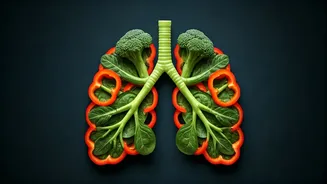Food and Lungs
The respiratory system is vital, constantly working to provide oxygen. It's easy to overlook the impact of our diet on its delicate balance. Certain foods
can trigger inflammation, mucus production, and other issues that impede the lungs' ability to function optimally. Becoming aware of these dietary culprits allows for proactive steps towards better lung health. Understanding the link between what you eat and how you breathe empowers you to make informed decisions for a healthier respiratory system, leading to enhanced overall wellness.
Processed Meats
Processed meats, often loaded with nitrates and sulfites, pose a significant risk to respiratory health. These additives act as irritants, potentially causing inflammation and narrowing of the airways. This is particularly problematic for individuals with asthma or other respiratory conditions, as it can worsen symptoms and trigger attacks. Avoiding or minimizing consumption of processed meats, such as bacon, sausages, and deli meats, can have a noticeable positive impact on your breathing. Opting for fresh, unprocessed alternatives is a step towards supporting lung function and promoting overall health.
Sugary Drinks
Sugary drinks are often associated with weight gain and increased risk of diabetes. But their impact on lung health is less widely known. High sugar intake contributes to systemic inflammation, which can affect the respiratory system. Inflammation in the lungs can make it harder to breathe and worsen existing conditions. Furthermore, excess sugar can weaken the immune system, making you more susceptible to respiratory infections. Cutting back on sugary drinks, including sodas, sweetened teas, and fruit juices, helps reduce inflammation and improves overall respiratory well-being. Consider water or unsweetened alternatives to support healthier lungs.
Excess Dairy
For some, dairy consumption may contribute to increased mucus production. This excess mucus can clog airways, making breathing more difficult. While dairy doesn't affect everyone in the same way, those prone to mucus-related respiratory issues should consider limiting their intake. Symptoms of dairy intolerance or sensitivity, such as coughing or congestion, may be indicative of a negative reaction. Experimenting with dairy alternatives, like almond or soy milk, can determine if this helps improve your respiratory symptoms. Listen to your body and adjust your diet accordingly for clearer breathing and better lung function.
Salty Foods
High-sodium foods can worsen fluid retention, which can impact lung health. Excessive fluid in the lungs can make breathing harder, especially for people with existing respiratory conditions. Ready-to-eat foods, fast foods, and processed snacks are often very high in sodium. Be mindful of sodium content when preparing meals and purchasing groceries. Opt for fresh, whole foods and limit processed options to reduce sodium intake. This simple dietary adjustment can help decrease fluid retention and support clearer, easier breathing, improving overall lung function.
Fried Foods
Fried foods are often high in unhealthy fats that can trigger inflammation throughout the body, including the lungs. The process of frying can also create compounds that irritate the respiratory system. These factors can contribute to breathing difficulties. Reduce your consumption of fried foods to help decrease inflammation and support healthier lungs. Focus on healthier cooking methods, such as baking, grilling, or steaming. These methods reduce the intake of unhealthy fats and irritants, contributing to better respiratory health. Making these choices offers a pathway to better lung function.
Refined Grains
Refined grains, such as white bread and pasta, are low in fiber and can contribute to inflammation. This inflammation may have effects on your lungs and respiratory pathways. Fiber plays a vital role in reducing overall inflammation. Switching to whole grains, like brown rice or whole-wheat bread, may provide more sustained energy and reduce inflammation. Choose complex carbohydrates that provide essential nutrients. Reducing your intake of refined grains is a simple step towards supporting better lung health. It helps decrease inflammation and improves overall well-being. These choices can contribute to improved lung function.

















